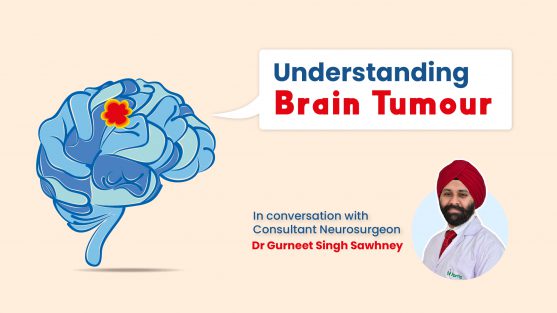Dr Gurneet Singh Sahwney has over 14 years of experience and is currently Consultant – Neuro and Spine Surgery at Fortis Hospitals, Mulund, Mumbai.
Dr Sahwney explains that the advancements in medicine over the last decade have greatly improved survival rates related to brain tumours. Through this interview he hopes to dispel the myths around this type of cancer and persuade patients and caregivers that with the right treatment, at the right time, brain cancer can be successfully treated.

Are all brain tumours cancerous?
A tumour is an abnormal growth in any part of the body. When such a tumour develops in the brain, it is called a brain tumour.
Not all brain tumours are cancerous. There are two types of brain tumours:
- Benign tumours: These are not cancerous. They do not grow to invade surrounding tissues.
- Malignant tumours: These are cancerous.
This article deals with the malignant brain tumours.
Why do some people get brain tumours while others do not?
The exact cause of brain tumours is not known. Certain genetic conditions like neurofibromatosis type 1 and neurofibromatosis type 2 may increase the risk of developing brain tumours.
How can a person know if they have a brain tumour?
There are a few symptoms that may indicate a brain tumour. It should be remembered that these same symptoms can also indicate other illnesses and so cannot be taken as a sure sign of brain tumours.
Some of these symptoms are:
- Early morning headache
- Headache combines with projectile vomiting
- Unconsciousness
- Seizures or convulsions
The symptoms caused by the tumour also depend on the location of the tumour. You can read more about the warning signs of brain tumour here.
For example, if a tumour is located in the frontal part of the brain may lead to behavioural changes in the person. He or she may experience extreme outbursts of anger and aggression that were not a part of their personality earlier.
Tumours in the temporal lobe tend to cause speech difficulties and memory issues.
Tumours in the lower part of the brain affect hormonal function and vision.
Although these symptoms may suggest a problem, to confirm a brain tumour, you will need to undergo an MRI scan. For tumours in hard to reach areas, a stereotactic biopsy may be used to confirm the diagnosis.
How is a brain tumour treated?
Treatment for a brain tumour depends on the type, size and location of the tumour.
Treatment options include surgery, radiation therapy and chemotherapy.
Some brain tumours can be surgically removed for a complete cure. Other tumours require treatment like radiation therapy and chemotherapy after surgery. Some tumours cannot be surgically removed due to their location. Attempting to surgically remove such tumours may lead to loss of certain brain functions. A special type of radiation therapy called stereotactic radiosurgery with Gamma Knife or CyberKnife may also be suitable to treat some of the tumours that cannot be treated with surgery.
Will there be side-effects from brain tumour surgery?
The areas of the brain that are used for speech, motor activities and sensory perception are called the eloquent areas of the brain. If the tumour is present in the eloquent area of the brain then surgery can have some side-effects related to these specific functions.
However, there are now ways of avoiding severe side-effects and even of dealing with the possible side-effects of brain surgery. Dr Gurneet explains how he performed an awake surgery, in which the patient was awake and responding during the brain surgery to ensure that the speech areas of his brain were not affected.
A message from Dr Gurneet
Dr Gurneet has a very clear message to patients and caregivers of brain tumours. To win against brain tumours, you will need the right treatment at the right time. The treatment is mostly in the hands of your team of oncologists. But there are some things you can do to help in this fight.
-
Do not fear
Very often people fear this disease, and tend to feel that they cannot win against it. They take brain tumour to be a death sentence and feel most treatments will be ineffective in the long run. This is no longer the case.
Treatment options have advanced over the last decade and many new options are now available. The survival rates have also improved.
The first step towards beating this disease is to stop fearing it. Caregivers and patients must try to stay focused on the treatment, with a positive frame of mind.
-
Trust your doctor
Dr Gurneet explains that no doctor will wish anything less than the best for their patient. A successful treatment is a matter of great pride for any doctor.
It’s important to be able to trust your treating team of oncologists. If you feel unsure about their skills or intentions, then do take a second opinion to confirm that you are on the right treatment path.
Knowing that you are getting the best possible treatment, will give you the confidence to keep fighting against the disease.

